
Châteauneuf-du-Pape Wines
Even though the Chateauneuf vineyards date back to the 12th century, it wasn’t until the 14th century that Chateauneuf-du-Pape took on an important viticultural role. This was the time when the...Read More

In-Stock

In-Stock

In-Stock

In-Stock

In-Stock

Stock currently at the producing estate – Will ship after 26 February 2026

In-Stock

In-Stock

Stock currently at the producing estate – Will ship after 26 February 2026
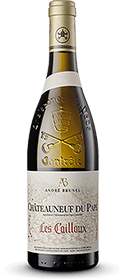
In-Stock

In-Stock

In-Stock

In-Stock

En Primeur Wines – delivery in early 2027

En Primeur Wines – delivery in early 2027

In-Stock

In-Stock
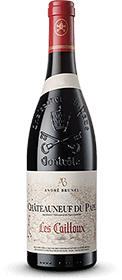
In-Stock

In-Stock

Stock currently at the producing estate – Will ship after 2 March 2026

Stock currently at the producing estate – Will ship after 2 March 2026

Stock currently at the producing estate – Will ship after 2 March 2026

Stock currently at the producing estate – Will ship after 21 March 2026

In-Stock

In-Stock

In-Stock

In-Stock

In-Stock

Stock currently at the producing estate – Will ship after 2 March 2026

In-Stock

In-Stock

In-Stock
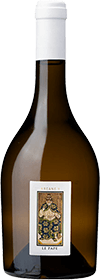
Stock currently at the producing estate – Will ship after 2 March 2026

Stock currently at the producing estate – Will ship after 21 March 2026

In-Stock

Stock currently at the producing estate – Will ship after 25 February 2026

In-Stock

In-Stock

In-Stock

In-Stock

In-Stock

In-Stock

In-Stock

In-Stock

In-Stock
The Intricacies of Chateauneuf-du-Pape
Expanding over a sprawling 3,133-hectare terrain planted with a seemingly infinite range of grape varieties, Châteauneuf-du-Pape is truly grandiose in scale. This AOC-level appellation in the Southern Rhone Valley is home to a vast array of estates producing some of France’s most sought-after red and white wines, made even more extraordinary by the region’s intricate history and terroir.
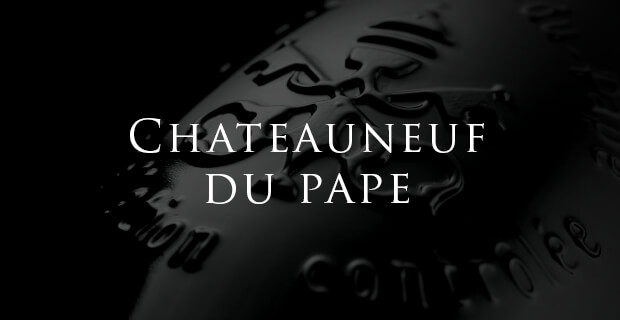
Châteauneuf-du-Pape: The Wine of Popes
Look more closely at the label on a bottle of wine from Châteauneuf-du-Pape and you will likely notice a pair of papal keys. In the fourteenth century, the popes fled Rome, choosing Avignon as their new home, where they would reside from 1309 to 1378. At this time, the region was already home to grape vines, planted by Bishop Geoffroy of Avignon as early as 1157. Clement V, the first pope to move to Avignon, also planted vines, essentially becoming one of the first winemakers of Châteauneuf-du-Pape.
When Pope John XXII arrived in Avignon, he fell in love with these wines, bestowing upon them the prestigious title of “Vin du Pape” (or Vin des Papes, Papal Wine). The region producing them would become known as “Le Châteauneuf-du-Pape” (or, “the new castle of the pope). John XXII also ordered the construction of the Châteauneuf-du-Pape castle, which serves as the symbol for this prestigious appellation. Since then, the castle (and the vines and villages it overlooks) has survived the passage of time, religious wars, the French Revolution and German bombings, with one remaining tower still reigning over the steadfast appellation.
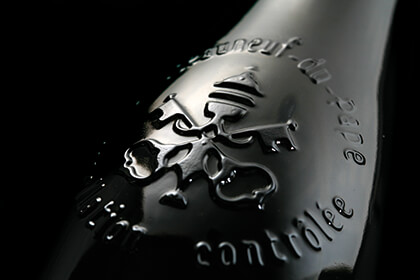
The AOC Status of Châteauneuf-du-Pape: The Promise of Quality
This region wasn’t always referred to as Châteauneuf-du-Pape. Back in 1094, the village was named “Castro nova” meaning “new fortified village.” During the thirteenth century, the village changed its name to “Châteauneuf-Calcernier,” in which “calcernier” referred to the lime kilns located in the village. From the 16th century on, the place was often called Châteauneuf-du-Pape, referring to its connection to Pope John XXII. It wasn’t until 1893, however, that the village officially changed its name to Châteauneuf-du-Pape.
The wines of Châteauneuf-du-Pape eventually became very popular abroad, with almost 2,000 hectolitres exported in 1829. At this time, several winemakers outside of the region tried to benefit from the Châteauneuf-du-Pape name by trying to pass off their wines and grapes as coming from this commune. In order to protect the region from this type of fraud and to maintain the quality of their wines, the winemakers of Châteauneuf-du-Pape united in 1894 to form the very first Syndicat Viticole (Winemakers’ Union).
In 1923, the region’s most famous winemaker, Baron Le Roy de Boiseaumarie from Château Fortia, took the first steps toward establishing the Appellations d’Origine Controlee (AOC) of France, a classification of controlled designations of origin. The “Cheteauneuf-du-Pape Winemakers’ Union” was created with its aim being to lobby for AOC status for the region. At the helm of this union was Baron Le Roy, whose professional experience as a lawyer helped in navigating the French court system. Châteauneuf-du-Pape finally obtained its AOC status in 1936, becoming France’s very first winemaking AOC.
Châteauneuf-du-Pape: A Mosaic of Terroirs
Unlike the northern Rhône Valley, the southern Rhône is a hot and dry region, with an average of 2,800 hours of sunshine per year. The Mediterranean climate brings long, hot summer days and cool, wet winters. The many hills and plateaus of this area are home to goblet vines (also known as “bush vines”), pruned into the shape of a cup to protect the grapes from the harsh rays of the sun.
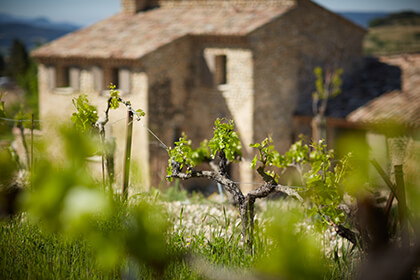
The vineyards here enjoy a bit of relief from the heat when the cool breezes of the Mistral Wind blow by from the northeast. Blowing at a speed that can reach over 100 km/h, the Mistral dries out the grapes, helping concentrate the sugars and flavours in the latter. However, the Mistral can also be quite destructive. By blowing for too long, it can suck out an excessive amount of water from the vines, dehydrating them completely. These winds can also uproot the vines. For the most part, however, the Mistral is more of a blessing than a curse, keeping the vines dry, free of bad bacteria and diseases.
The Châteauneuf-du-Pape appellation is home to a patchwork of eighteen different types of soil. While the rocky western side of the region is dominated by limestone soil, with sand, clay and large stones found on the plateaus, the northern part is characterised by a mixture of sand, red and grey clay, and limestone. Less stony soils, alternating with marl can be found to the east. In the south, shallow sand and clay subsoils dominate, resting on a well-draining layer of gravel.
One of the most emblematic features of the Châteauneuf-du-Pape terroir are the large, round pebbles (galets roulés), left behind by glaciers millions of years ago. These galets store heat during the day, radiating it at night and keeping the vines warm, which contributes to the even ripening of the grapes! These stones also store water in the soil, providing a much-needed reserve for the vines during the scorching hot days of summer. The Plateau de la Crau area of Châteauneuf-du-Pape offers what is perhaps the most representative terroir of this wine region.
Grape Varieties of Châteauneuf-du-Pape: The Three Musketeers of the GSM Blend
Mirroring the complexity of soil types in Châteauneuf-du-Pape is the wide array of grape varietals planted in the appellation. Thirteen grape varietals are allowed in the blend of Châteauneuf-du-Pape wines, not including the many different colour variants of these grapes. Grenache, for example, has four variants: Grenache noir, rose, gris and blanc (black, rose, grey and white). So, there are actually a total of 22 authorised grapes in this appellation!
Grenache is considered the backbone of the appellation and is often blended with Syrah and Mourvèdre to produce the iconic “GSM” blend. These wines are aromatic, full-bodied, with flavours of dark fruit and spice. In the classic GSM blend, Grenache brings red fruit flavours and high alcohol, Mourvèdre the power and pigment, and Syrah balances out the other two. Although these “three musketeers” tend to dominate the GSM blend, the latter also sometimes includes Cinsault and Counoise, or trace amounts of Vaccarese, Muscardin, Picpoul and Terret Noir. Red wines of Châteauneuf-du-Pape can also include white varietals - like Clairette, Bourboulenc, Roussanne and Picardin – in the blend, a true singularity of the appellation!
While red wines make up around 93% of the production in Châteauneuf-du-Pape, the AOC is responsible for some of the rarest and most renowned white wines of France. The most common white grape varietals to be found in these are Grenache Blanc, Roussanne, Clairette Blanche and Bourboulenc. Because Grenache Blanc receives plenty of sun throughout the year, the grapes ripen with a high sugar level, giving the finished wine a high level of alcohol. Clairette Blanche and Bourboulenc bring plenty of freshness and a citrusy character, while Roussanne offers notes of peach. And for the texture and tannins, look no further than Clairette Rose. The white blends of Châteauneuf-du-Pape are truly rare, but definitely worth tasting.
A Common Thread through the Wines of Châteauneuf-du-Pape
Describing one style of Châteauneuf-du-Pape wines presents a challenge, since the dynamic terroir and endless number of varieties grown there are produced in a sheer number of styles by a vast array of producers. There is, however, a common thread tying together all of these styles: a warmth and a richesse, a spiciness and ripe fruit. These wines tend to offer red fruit flavours of raspberry and strawberry, along with black fruits, like black cherries, blueberry and black currant. The profile of these wines also has an earthy side, with notes of leather and barnyard coming through on the nose and palate. Oaky flavours reveal themselves through tobacco, toast, smoke and baking spices (think clove and vanilla).
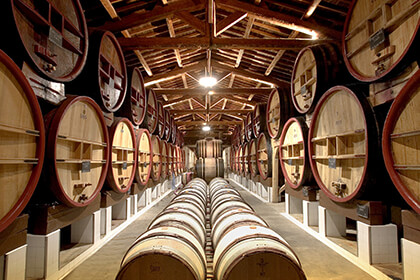
Blends with higher proportions of Mourvèdre show a gamey or barnyard character, coming from the Brettanomyces yeast that can be found in wineries, especially in oak barrels. Commonly referred to as “Brett”, this quality is a source of debate among wine lovers, with some enjoying the extra complexity it seems to give wines, while others not fond of it at all. Either way, allowing the wine to sit open for a few hours will dissipate the most powerful barnyard aromas.
Châteauneuf-du-Pape wine also tends to have higher alcohol levels than other French wines, with the minimum strength being 12.5%, but most starting at 14%. Whatever your preference may be, Châteauneuf-du-Pape offers a wide range of styles, from fresh and elegant to the more tannic and austere.
The Estates of Châteauneuf-du-Pape: Keepers of the Papal Keys
One of the appellation’s most prestigious ambassadors is Château de Beaucastel, which has been in the Perrin family for five generations. The estate’s eponymous cuvee Château de Beaucastel is a masterpiece red blend with thirteen varieties, dominated by Grenache and Mourvèdre. The Château de Beaucastel Hommage à Jacques Perrin is one of the appellation’s rarest wines, paying homage to the owner’s father. This age-worthy wine is made exclusively in the best vintages from mostly old Mourvèdre vines, which produce very small yields of intensely concentrated and mature berries.
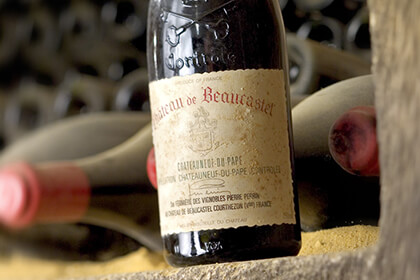
Another great representation of the appellation is Château La Nerthe. This is one of the oldest estates in the region, dating back to the 12th century, to the very beginning of wine production in Châteauneuf-du-Pape. The vineyards have been certified organic since 1998 and grow all thirteen permitted varieties. Some of the vines here are up to 100 years of age. One of the estate’s crown jewels is the La Nerthe Cuvee des Cadettes, first created at the end of the 1800s! This wine is truly a fantastic representation of a GSM blend at its best.
Paul Vincent Avril at Clos des Papes crafts some of France’s finest Grenache-dominated reds, which has been made by the family for over a century. Their philosophy of keeping yields low, using no new oak for maturation and not filtering contribute to a certain complexity in their wines.
Domaine de la Vieille Julienne is another remarkable estate specialising in Grenache-based wines, made from vines as old as 100 years. Jean-Paul Daumen took over the family estate in 1990 and has converted the property to biodynamics. One of the estate’s most acclaimed wines is the Domaine Vieille Julienne Reserve, only made in the best years.
Another must-try reference of the appellation, Château Rayas dates back to 1880, but it was Jacques Reynaud, one of the greatest winemakers in the world, who brought it to its present fame. His nephew Emmanuel continues his uncle’s work today. The estate covers 23 hectares of vines, of which 12 are situated in Châteauneuf-du-Pape.
The dazzling diversity and dynamic nature of Châteauneuf-du-Pape allows the region to have something to match every preference, whether you desire a masterful blend of 13 varietals, a classical GSM or a rare single-varietal cuvee.
The impeccable scale of Châteauneuf-du-Pape helps make it one of the most intriguing appellations of France. This region is home to a multitude of terroirs and grape varieties, each planted to the terroir that best fits its needs. If there is one word to describe the wines of Châteauneuf-du-Pape, its “intricate.” The wines produced here will engulf you, awakening your senses and leaving you yearning for just one more sip of the pure radiance expressed in the glass.